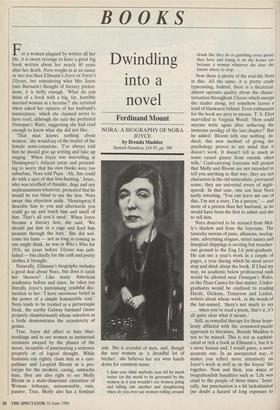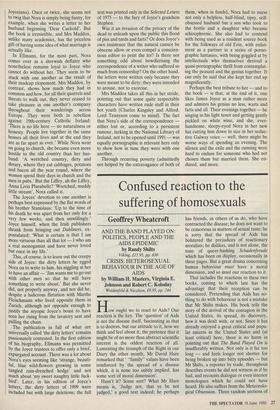BOOKS
For a woman plagued by writers all her life, it is sweet revenge to have a great big book written about her nearly 40 years after her death. Nora weighs in at an ounce or two less than Ellmann's Joyce or Joyce's Ulysses, but considering what Mrs Joyce (nee Barnacle) thought of literary preten- sions, it is hefty enough. 'What do you think of a book with a big, fat, horrible married woman as a heroine?' she retorted when asked her opinion of her husband's masterpiece, which she claimed never to have read, although she said she preferred Finnegan's Wake, suggesting she had read enough to know what she did not like.
`That man knows nothing about women,' she would say of the master of the female semi-conscious. 'I've always told him he should give up writing and take up singing.' When Joyce was marvelling at Hemingway's African yarns and pretend- ing to worry that his own books were too suburban, Nora told Papa. `Ah, Jim could do with a spot of that lion-hunting.' Joyce, who was terrified of thunder, dogs and any unpleasantness whatever, protested that he would be too blind to see the lion. Nora swept this objection aside. Ilemingway'd describe him to you and afterwards you could go up and touch him and smell of him. That's all you'd need.' When Joyce became a literary lion, she said, 'We should put him in a cage and feed him peanuts through the bars.' She did wel- come his fame — not as long in coming as one might think, he was in Who's Who for 1916, six years before Ulysses was pub- lished — but chiefly for the cash and pretty clothes it brought.
Naturally, Ellmann's biography includes a good deal about Nora, but does it catch her likeness? Like many American academics before and since, he takes too literally Joyce's patronising youthful dec- laration to her: 'I have enormous belief in the power of a simple honourable soul.' Nora tends to be treated as a picturesque freak, the earthy Galway barmaid (more properly chambermaid) whose selection as a bride demonstrates the eccentricity of genius.
True, Joyce did affect to hate blue- stockings and to see women as instinctual creatures swayed by the phases of the moon, incapable of punctuating a sentence properly or of logical thought. While feminists can rightly claim him as a sym- pathiser and Leopold Bloom as a pro- totype for the modern, caring, unmacho man, they are also right to see Molly Bloom as a male-chauvinist caricature of Woman: lethargic, unreasonable, vain, passive. True, Molly also has a feminist
Dwindling into a novel
Ferdinand Mount
NORA: A BIOGRAPHY OF NORA JOYCE by Brenda Maddox Hamish Hamilton, L16.95, pp. 589 side. She is scornful of men, and, though she sees women as 'a dreadful lot of bitches', she believes her sex wins hands down for common sense: I dont care what anybody says itd be much better for the world to be governed by the women in it you wouldn't see women going and killing one another and slaughtering when do you ever see women rolling around
drunk like they do or gambling every penny they have and losing it on the horses yes because a woman whatever she does she knows where to stop. . . .
Now there is plenty of the real-life Nora in this. All the same, it is pretty crude typecasting. Indeed, there is a theatrical, almost operatic quality about the charac- terisation throughout Ulysses which sweeps the reader along, yet somehow leaves a kind of blankness behind. Even enthusiasts for the book are prey to unease. T. S. Eliot marvelled to Virginia Woolf: 'How could anyone write again after achieving the immense prodigy of the last chapter?' But he added: 'Bloom tells one nothing. In- deed, this new method of giving the psychology proves to my mind that it doesn't work. It doesn't tell as much as some casual glance from outside often tells.' Card-carrying Joyceans will protest that Molly and Bloom are not intended to tell you anything in that way; they are not characters in the old naturalistic, provincial sense; they are universal rivers of night- speech. In that case, one can hear Nora tartly retorting, 'You can leave me out of this, I'm not a river, I'm a person,' — and more of a person than her husband, as he would have been the first to admit and she to tell him.
Nora deserved to be rescued from Mol- ly's shadow and from the Joyceans. The tussocky morass of puns, allusions, neolog- isms, advertising slogans, street names and liturgical chippings is inviting but treacher- ous ground to the Eng Lit post-graduate. He can see a year's work in a couple of pages, a year during which he need never stop and think about the book. If I had my way, no academic below professorial rank would be allowed near Finnegan's Wake, or the Pisan Cantos for that matter. Under- graduates would be confined to reading Hardy, Dickens, Tennyson and Larkin, writers about whose work, in the words of the last-named, 'there's not much to say . . . when you've read a poem, that's it, it's all quite clear what it means.'
Still, as remedial therapy for those hope- lessly afflicted with the crossword-puzzle approach to literature, Brenda Maddox is not to be missed. This is not as sophisti- cated or rich a book as Ellmann's, but it is 'a more human and, I would guess, a more accurate one. In an unexpected way, it makes you reflect more attentively on Joyce's work as well as on the Joyces' life together. Now and then, you wince at biografiendish banalities such as 'Life was cruel to the people of those times.' Ironi- cally, her punctuation is a bit lackadaisical (no doubt a hazard of long exposure to Joyceiana). Once or twice, she seems not to twig that Nora is simply being funny, for example, when she writes a letter to her husband beginning `Dear Cuckold'. But the book is irresistible, and Mrs Maddox, unlike many academics, has the priceless gift of having some idea of what marriage is actually like.
In Ellmann, for the most part, Nora comes over as a shrewish deflater who nonetheless remains loyal to Joyce who cannot do without her. They seem to be stuck with one another as the result of their madcap elopement. Mrs Maddox, by contrast, shows how much they had in common and how, for all their quarrels and threats to walk out, they never ceased to take pleasure in one another's company throughout their wanderings across Europe. They were both in rebellion against 19th-century Catholic Ireland: `There is no life here — no naturalness or honesty. People live together in the same houses all their lives and at the end they are as far apart as ever.' While Nora went on going to church, she became even more hostile to the old country than her hus- band: 'A wretched country, dirty and dreary, where they eat cabbages, potatoes and bacon all the year round, where the women spend their days in church and the men in pubs.' But the Liffey, ah the Liffey, Anna Livia Plurabelle? 'Wretched, muddy little stream', Nora called it.
The Joyces' devotion to one another is perhaps best expressed by the flat words of his brother Stanislaus: 'Up to the time of his death he was apart from her only for a very few weeks, and then unwillingly.' Joyce himself, when the Irish publishers shrank from bringing out Dubliners, ex- postulated: `What is certain is that I am more virtuous than all that lot — I who am a real monogamist and have never loved but once in my life.'
This, of course, is to leave out the creepy side of Joyce: the dirty letters he egged Nora on to write to him, his niggling at her to have an affair — `Jim wants me to go out with other men so that he will have something to write about.' But she never did, not properly anyway, and nor did he, despite a ludicrous flirtation with Marthe Fleischmann who lived opposite them in Zurich, although not opposite enough to justify the myopic Joyce's boast to have seen her rising from the lavatory seat and pulling the chain.
The publication in full of what are universally called `the dirty letters' remains passionately contested. In the first edition of his biography, Ellmann was permitted by the Joyce trustees to offer only a brief, expurgated account. There was a lot about Nora's eyes seeming like `strange, beauti- ful, blue wild-flowers growing in some tangled rain-drenched hedge' and not much about `my sweet naughty little fuck- bird'. Later, in his edition of Joyce's letters, the dirty letters of 1909 were included but with large deletions; the full text was printed only in the Selected Letters of 1975 — to the fury of Joyce's grandson Stephen.
Was it an invasion of the privacy of the dead to unleash upon the public this flood of piss and turds and farts? Or does Joyce's own insistence that the natural cannot be obscene allow or even compel a conscien- tious editor to print the lot? Is there not something odd about bowdlerising the correspondence of a writer who suffered so much from censorship? On the other hand, the letters were written only because they were meant to be dirty; they were intended to arouse, not to exorcise.
Mrs Maddox takes all this in her stride, pointing out that some quite respectable characters have written rude stuff in their hot youth (Charles Kingsley and Alfred, Lord Tennyson come to mind). The fact that Nora's side of the correspondence either lost or, according to a persistent rumour, lurking in the National Library of Ireland, not to be opened until 1991 — was equally pornographic is relevant here only to show how in tune they were with one another.
Through recurring poverty (admittedly not helped by the extravagance of both of them, when in funds), Nora had to nurse not only a helpless, half-blind, tipsy, self- obsessed husband but a son who took to the bottle and a daughter who became schizophrenic. She also had to contend with being used as a resident source book for the folkways of old Erin, with enlist- ment as a partner in a series of porno- graphic fantasies, with being goggled at by intellectuals who themselves derived a quasi-pornographic thrill from contemplat- ing the peasant and the genius together. It can only be said that she kept her end up magnificently.
Perhaps the best tribute to her — and to the book — is that, at the end of it, one likes James Joyce as a man rather more and admires his genius no less, warts and farts and all. Their evenings together — he singing in his light tenor and getting gently pickled on white wine, and she, ever- handsome, sleepy-eyed Nora in her new hat cutting him down to size in her seduc- tive Galway voice — well, there might be worse ways of spending an evening. The silence and the exile and the cunning were hard to endure for someone who had not chosen them but married them. She en- dured, and more.



















































 Previous page
Previous page